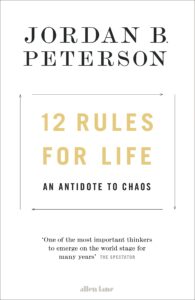I have been meaning to read one of Jordan Peterson’s books for some time. This is mostly because I have seen his quotes and videos posted all over social media and many conservative Christians, in particular, seem quite captivated with him. After reading the book, I cannot help but wonder if this captivation is more due to agreement with sound bites and videos several minutes long than with a careful analysis of his moral philosophy. Whatever the case might be, I think it is important that his teachings are analyzed carefully before being swallowed whole.
Let us make no mistake, Peterson is neither a Christian nor a friend of Christians. This is not a statement of hostility toward him. He seems a nice man and I do believe he sees himself as a friend of Christians. But what I mean is that, while many of his conclusions are compatible with Biblical Christian ethics, his means of getting there is certainly not, and we must beware!
What is Peterson? His training is as a clinical psychologist, and all evidence would suggest that he is a very good one. But the book I am reviewing here is not primarily a book on clinical psychology, it is a book on moral philosophy. While Peterson’s credentials are not in philosophy, he is quite a good philosopher. He is logical, data driven and well informed. I suspect that he is the darling of so many evangelical hearts because of his poignant and compelling criticisms of progressivism and the far left, in which he exposes many of their mindless philosophical contradictions with clarity and wit. But let us not be confused, he does not do this from the perspective of a biblical worldview.
While Peterson’s book is permeated with biblical references, its philosophical basis is evolutionary from start to finish. He begins with comparisons between lobsters and human beings and works his way from there to proper human behavior, with references to chimpanzees as our closest ancestors and a thorough emersion in the standard evolutionary understanding of where human beings came from. On this basis, his moral philosophy is a pragmatic one. He tells us we should live according to his 12 rules, with all his verbose commentary, not because they are intrinsically right, but because they work. Because they provide the best existence for humanity both individually and corporately. It is not that we should live the right way because God said it, nor that righteousness and holiness reflect God’s eternal moral character. It is because it works, pure and simple. By discarding the wisdom of the past, we are turning our backs, not of the dictates of an omniscient Creator, but on the wisdom of millions of years of evolution. The latter tenant is stated in the book more than once.
What of his use of the Bible. First, as a Biblical Studies professor, I can only say that I wish he approached popular historical critical scholarship with the same critical thinking that he approaches progressivism. He swallows theories like the Documentary Hypothesis whole, apparently unaware of the total lack of historical and literary evidence for them. But he can be forgiven for this. No doubt he is trusting the wisdom of the “experts.” Given his level of research in other subjects, I just wish he had put in a little more here. Alas.
What of his use of the Bible itself? He discusses it in terms of archetypal patterns as a key to human psychology and evolutionary development. The Bible is not, in his view, God’s direct special revelation of himself to human beings, but something akin to the view of many contemporary theologians who see it as a reflection of humanity’s yearnings and struggles to understand God. His discussions of scripture essentially follow the pattern of twentieth century theological liberalism – trying to find meaningful metaphors for human existence and preserve traditional moralities without traditional doctrines. The atoning death of Christ for sin, for example, is a doctrine to be mined for its positive contributions to modern ideas of human equality. But it can be just as easily critiqued for its inherent problems. For Peterson, the doctrine of Justification by Faith helped solve some problems, but we must now correct the problems it created.
Jordan Peterson makes no claim to be a Bible believing Christian. So, I am not critical on him for his views. On the one hand, he is a good philosopher who is fun to read. On the other hand, he is a non-believer who needs to get saved. I pray he will.
The danger is the affinity so many Bible believing Christians have for him. Because he agrees with so many of our traditional ethical ideas, we want so badly to make him one of us. BEWARE! Peterson’s approach to a better society has been tried and failed. The modern progressivism he decries is a result of the very philosophical methods he advocates. Namely, traditionalism and conservatism without God the Trinity, and without the sacrificial atoning death of Christ as the only means by which human beings can be reconciled to a holy God. For decades, the United States in particular maintained christian (small c deliberate) moralism without the Word as an infallible standard. After a while, society realized that without authoritative divine revelation, traditional morality had no objective basis. Jordan Peterson’s archetypal and symbolic musings are very clever, but they do not provide any more objective basis for truth than twentieth century theological liberalism. Beware any conservatism without Christ. It is the high road to a new “progressivism.”


Leave a Reply